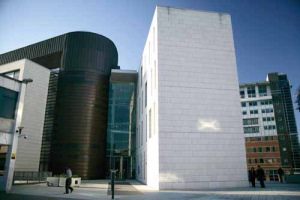Manchester benefits from funding boost for biotechnology
12 Nov 2012
The University of Manchester has won a significant share of £20million of Government funding for research work that will help revolutionise major industries in bioenergy and biotechnology.

The two sLoLa grants from the Biotechnology and Biological Sciences Research Council (BBSRC) were announced on Friday by the Chancellor, George Osborne. They will fund research work taking place at the Manchester Institute of Biotechnology.
Professor Nicholas Turner has been awarded £4.4million from the BBSRC to work on identifying biological alternatives to chemicals that are currently derived from fossil fuels. The funding adds to a £500,000 grant from the pharmaceutical company Glaxo Smith Kline which will be working in collaboration with Professor Turner.
Welcoming the funding Professor Turner explained: “During the next two decades the chemical industry will undergo a major transformation. As both oil and natural gas begin to run out, there will be a growing need to switch from oil-based starting materials to those derived from biomass. Biotechnology-based processes will need to be developed to efficiently convert inexpensive raw materials to high-value products such as pharmaceutical drugs, cosmetics and fuels. Industrial biotechnology involves the use of nature's catalysts, known as enzymes, for the production of chemicals and related products.”
The researchers will develop a new approach to engineering robust biocatalysts by mimicking the process of evolution in the laboratory. This new platform technology will enable the optimisation of enzymes for industrial applications in a matter of weeks rather than the months which it currently takes.
Professor Turner says: “Our work will help develop a much greener approach to the production of a wide variety of products. I’m pleased that the BBSRC and Glaxo Smith Kline recognise the global importance of this research.”
Talking about the collaboration with MIB, Joe Adams, Chemistry and Analysis Manager at GlaxoSmithKline, said: “This research will yield substantive advantage to the scientific community involved in industrial biotechnology. The University of Manchester is a recognised leader within this field and represents a strong partner for the synthetic biochemistry team at GSK to develop new biotechnologies. Being able to engineer bespoke biocatalysts more efficiently will result in a much wider application to our chemical manufacturing processes, and support our research into new medicines.”
The second BBSRC grant of £4.5million is being shared across a number of academic institutions, including The University of Manchester. The money is also partnered by a £500,000 grant from the agrochemical company Syngenta.The research will be co-ordinated by Professor Greg Challis at the University of Warwick.
Professor Jason Micklefield, based at the Manchester Institute of Biotechnology, will be working with colleagues at the universities of Warwick, Bristol and Cambridge to understand more about how the beneficial compounds in microorganisms can be exploited to develop new agricultural chemicals.
Many microorganisms produce beneficial compounds, such as penicillin made by a fungus. Most microbes have the capacity to produce many more compounds than are actually observed. If their full potential can be activated then it could provide new compounds for testing as medicines and agricultural chemicals.
The BBSRC grant will fund an ambitious programme to rapidly sequence the genomes of 40 microorganisms with the known ability to produce potential compounds that benefit agriculture. Clusters of genes responsible for synthesising these compounds will be identified so that they can be harnessed to make useful products.
Professor Micklefield says: “There is huge potential to harness the beneficial compounds produced by microorganisms. Working across a number of universities means we can pool our specialist knowledge to take our research to the next level. We will utilise our expertise in biosynthetic engineering to alter the structure and improve the bioactivity of the microbial natural products, which is highly complementary to the natural product discovery and biosynthesis expertise of the partnering universities. I’m grateful to the BBSRC and Syngenta for recognising the prospects for this research and the exciting discoveries we hope to uncover.”
